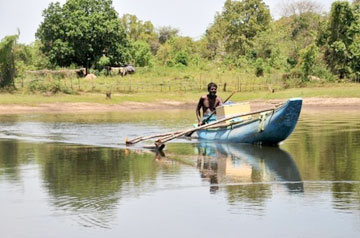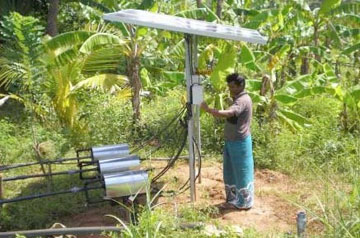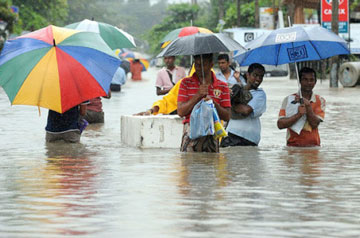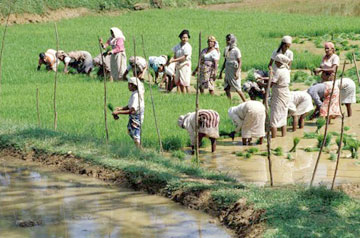Lanka geared to face climate change risks
By Dhaneshi Yatawara
Sri Lanka's close proximity to the equator is vital in understanding
the severity of climate change. Countries near the equator, receive
additional sunlight with less area to heat up, causing the temperature
in the region to be warmer than the North or South poles, where the
distance from the sun is greater and the heat from the sun in spread
over a much larger area.
 |

Promoting green energy |
 |
| Floods, an
adverse effect of climate change |

Drought resilient paddy cultivation |
Severe floods, such as the one that displaced 90,000 people in
Mozambique in 2008, are now common in Africa and Australia. Europe and
North America are getting intense downpours that could be devastating.
Melting ice in the Arctic is not only affecting the polar bears, but
already changing the culture and livelihoods of indigenous people in
Northern Canada.
It's about everything from melting ice, threat to animals and plants
and hunger, disease, drought, flooding, refugees and war - which seems
to be getting worse.
Being an island of 65,610 square kilometers close to the equator,
climate change will drastically alter the climate conditions of Sri
Lanka. As climate change occurs, Sri Lanka will undergo widespread
effects of climate change including, climate variability and sea-level
rise, directly affecting the abundance and security of endemic species.
Not only the environment is affected but also the agriculture sector
will face chaos in the face of climate change. Over 70 percent of our
people depend on agricultural activities for their livelihood. It is
being observed that the night temperature in Nuwara-Eliya has gone up
and weather in Nuwara Eliya will not be suitable for cultivation.
Sri Lanka experienced heavy rains and longer periods of droughts last
year. This type of weather patterns are expected to continue in the
future. The rate of sea level rising has increased. It has increased by
1.7mm per year from 1870 to 2010 and 3.28mm per year from 1993 to 2011.
This could cause problems to island states such as Sri Lanka as
coastal areas could be submerged. Climate change has already affected
agriculture, human health, eco-systems on land and in the oceans, water
supplies, and some people's livelihoods. Much of the extreme weather
that wreaked havoc in Asia, Europe and the Pacific region last year can
be blamed on human-induced climate change, according to the World
Meteorological Organisation.
Global warm will affect peaceful co-existence. There is a link
between warming temperatures and violence and rise in food prices,
depletion of water resources, health hazards and decline in economic
growth.
Scientists are still studying the full extent of the climate change
impact on Sri Lanka. Yet there is a growing concern that climate change
can threaten or reverse the significant achievements the country has
recorded in increasing incomes and poverty alleviation, the Sri Lanka
Climate Change Secretariat in its report on National Climate Change
Adaptation Strategy for Sri Lanka 2011-2016 revealed.
Sri Lanka's climate variability has increased. The Intergovernmental
Panel on Climate Change (IPCC) has released a report which states that
the effects of climate change are already occurring in all continents
and across the oceans. The report says that the world is not prepared
for climate change risks. The IPCC is the international body for
assessing the science related to climate change. It was set up in 1988
by the World Meteorological Organisation and the United Nations
Environment Program to provide policy makers with regular assessments of
the scientific basis of climate change, its impacts and future risks,
and options for adaptation and mitigation. Sri Lanka is a member of this
international body.
Disaster resilience
In such a backdrop Economic Development Ministry and UNDP Sri Lanka
marked the launch of its project under the Environmental Sustainability
and Disaster Resilience Program 'Strengthening the Resilience of Post
Conflict Recovery and Development to Climate Change Risks in Sri Lanka'.
The project seeks to address the climate-related problems posing a
serious threat to the government's objective of developing rural
economies to bridge the urban-rural income disparity.
The project aims to provide necessary technical and financial support
to the Rural Development Unit and the Divi Neguma Department of the
Ministry of Economic Development to safeguard the investments made in
uplifting the rural livelihoods against climate related disasters and
environmental changes.
"This has longer term perspective for climate change. When we were
trying to launch a program to enable Sri Lanka to face the climate
change consequences, we found that in the Sri Lankan strategy there were
few areas of priority - particularly agriculture and water," UNDP Acting
Assistant country Director (Environment) Tharuka Dissanaike said.
The UNDP was looking for a more grass-roots based made to convey
these concepts. A proper mechanism that would truly reach the areas and
people who were actually affected, said Dissanaike.
It is in this context that the rural development programs launched by
the Economic Development Ministry - particularly the Divi Neguma and the
Gama Neguma programs came in handy to achieve the objectives.
As the Climate Change Secretariat stated in the strategies for
adaptation, Sri Lanka needs to adapt to climate change to ensure that
its economic development could be sustained without setbacks to
investments on poverty reduction, food and water security and public
health.
Water managements
This program will be adding to the services extended by the Divi
Neguma and Gama Neguma programs and the authorities believe that
whatever the practices already implemented will be enhanced. This
environmental sustainability and disaster resilience program will guide
the implementers in managing water and land.
This will focus on building models of climate change adaptation in
Puttlam, Kurunegala and Ratnapura.
It will include developing institutional capacities to assess risk,
design corrective measures and implement adaptation actions with
community participation. To realise this, the project will work with a
range of technical partners- such as the Departments of Agriculture,
Agrarian Services, Irrigation, and Livestock and the Disaster Management
Centre.
"When we were planning the program we had to think where were the
most affected areas before investing. There are certain districts that
could withstand damage in terms of economy and society though they face
natural disasters. The program had to give priority to those districts,"
she said.
In association with the Department of Agriculture the project carried
out a vulnerability analysis using globally recognized tools.
Through this exercise twelve districts were prioritised. And we will
be doing a programs in all twelve districts. The first three districts
will be models," she added.
Education on climate change is vital to minimize carbon dioxide
emission and mitigate the impact of adverse weather conditions. |

